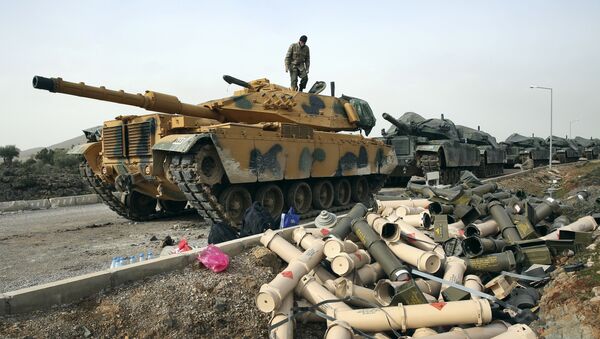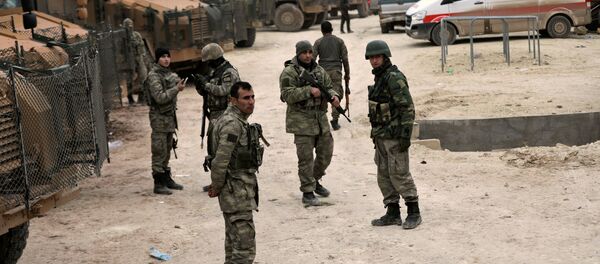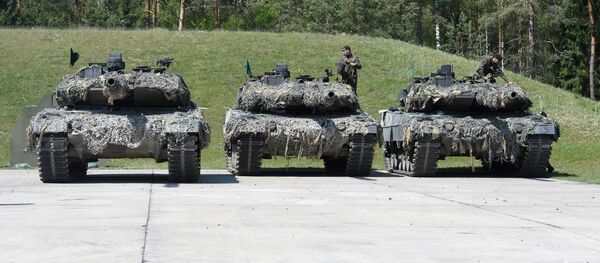Military Activity
Turkey's General Staff announced Wednesday that the Turkish Air Force conducted air strikes involving 27 aircraft against 47 Kurdish and Daesh targets on Wednesday. The military estimates that a total of 287 terrorists were killed in the first four days of Operation Olive Branch, the Turkish incursion into northwestern Syria which began after the US announced plans to create a Kurdish-militia operated border security force in the region.
Also on Wednesday, Afrin region's health department told Kurdish news agency Hawar that civilian casualties amid the operation had climbed to 35 amid Turkish shelling of populated areas, with more than 100 others sent to hospital. On the Turkish side, the governor of Kilis, a city near Turkey's border with Syria, said that one civilian had died in hospital after a missile attack fired from Afrin hit a local mosque. At least five others were wounded in that attack. The figures follow up on earlier reports of 15 civilians injured in Kurdish shelling of Turkish territory in border areas.
Television channel Al-Mayadin reported Wednesday that a column of Turkish tanks had entered an area in southern Aleppo province in an effort to crush Kurdish fighters in Afrin. The Firat news agency also reported that Kurdish militants in Afrin had repelled attacks by FSA militia, destroying three tanks and forcing the rest to retreat.
Clashes have been reported to be ongoing throughout the day.
Political and Diplomatic Announcements
Speaking to Sputnik, Turkish Deputy Prime Minister Mehmet Simsek emphasized Wednesday that Operation Olive Branch is "about border security, about national security," and that Turkey has "no quarrel with our Kurdish brothers." Reiterating the Turkish position that the Kurdish YPG militia are affiliated with the PKK, a Turkish Kurdish organization Ankara considers a terror group, Simsek pointed out that Turkey has recently faced some 700 incursions and attacks along the border with Afrin.
Turkish President Recep Tayyip Erdogan confirmed Wednesday that Ankara would not limit its military campaign to Afrin, and that the operation would be continued in Manbij, about 100 km to the east. "By launching Operation Olive Branch, we have stopped the games of different powers who seek to implement their plans in our region. We will completely clear the region of terrorists, beginning with [the Syrian city of] Manbij and throughout our entire border [with Syria], thereby ensuring our security," Erdogan said, speaking to local government officials in Ankara.
Also on Wednesday, Foreign Minister Mevlut Cavusoglu said that US Secretary of State Rex Tillerson had proposed the creation of a 30-km security area in northern Syria to avoid clashes between the Turkish and US militaries in a telephone conversation. Cavusoglu told Turkish media that he had urged the US to end its support for the YPG, and said that the US "does not want to face Turkey in the north of Syria."
Finally, Turkey's Anadolu news agency reported Wednesday that police had detained close to 150 people for social media posts in support of the Kurdish militia groups in Syria and Turkey. A law enforcement source speaking to the news agency confirmed that Turkish social media accounts are being monitored by police, and that all users spreading the propaganda of groups that Ankara characterizes as terrorists will be held accountable.
The Turkish military launched Operation Olive Branch on January 20, following repeated warnings by Ankara that it would intervene in Kurdish-controlled areas in northern Syria after the US announcement that it would begin the training of a border protection force consisting of Syrian Kurdish militia units.
Damascus has condemned the operation as an assault on Syria's sovereignty. Moscow, meanwhile, has urged all parties to exercise restraint, and called for the parties to respect Syria's territorial integrity.





